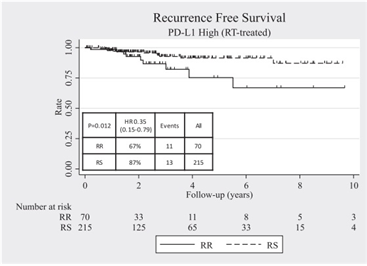글로벌 연구동향
방사선생물학
- 2017년 07월호
[Radiother Oncol.] A radiosensitivity gene signature and PD-L1 status predict clinical outcome of patients with invasive breast carcinoma in The Cancer Genome Atlas (TCGA) dataset.서울대/ 장범섭, 김인아*
- 출처
- Radiother Oncol.
- 등재일
- 2017 Jun 1
- 저널이슈번호
- pii: S0167-8140(17)30373-0. doi: 10.1016/j.radonc.2017.05.009. [Epub ahead of print]
- 내용

AbstractBACKGROUND AND PURPOSE:
We investigated the link between the radiosensitivity gene signature and programmed cell death ligand 1 (PD-L1) status and clinical outcome in order to identify a group of patients that would possibly receive clinical benefit of radiotherapy (RT) combined with anti-PD1/PD-L1 therapy.
MATERIAL AND METHODS:
We validated the identified gene signature related to radiosensitivity and analyzed the PD-L1 status of invasive breast cancer in The Cancer Genome Atlas (TCGA) dataset. To validate the gene signature, 1045 patients were selected and divided into two clusters using a consensus clustering algorithm based on their radiosensitive (RS) or radioresistant (RR) designation according to their prognosis. Patients were also stratified as PD-L1-high or PD-L1-low based on the median value of CD274 mRNA expression level as surrogates of PD-L1.
RESULTS:
Patents assigned to the RS group had decreased risk of recurrence-free survival (RFS) rate than patients in the RR group by univariate analysis (HR 0.45, 95% CI 0.25-0.81, p=0.008) only when treated with RT. The RS group was independently associated with the PD-L1-high group, and CD274 mRNA expression was significantly higher in the RS group (p<0.001) than the RR group. In the PD-L1-high group, the RS group was associated with better RFS compared to the RR group (HR 0.37, 95% CI 0.16-0.87, p=0.022) in multivariate analysis. The level of PD-L1 expression may represent the immunogenicity of tumors, and thus, we speculated that the PD-L1-high group had more immunogenic tumors, which could be more sensitive to radiation-induced immunologic cell death.
CONCLUSION:
We first evaluated the predictive value of the radiosensitivity gene signature and described a relationship with this radiosensitivity gene signature and PD-L1. The radiosensitivity gene signature and PD-L1 status were important factors for prediction of the clinical outcome of RT in patients with invasive breast cancer and may be used for selecting patients who will benefit from RT combined with anti-PD1/PDL1 therapy.
Author information
Jang BS1, Kim IA2.
1Department of Radiation Oncology, Seoul National University Graduate School of Medicine, South Korea.2Department of Radiation Oncology, Seoul National University Graduate School of Medicine, South Korea; Department of Radiation Oncology, Seoul National University, School of Medicine, South Korea; Department of Radiation Oncology, Seoul National University Bundang Hospital, South Korea. Electronic address: inah228@snu.ac.kr.
- 연구소개
- 최근 각광 받고 있는 면역치료의 대상인 PD-L1과 방사선민감성과 연관된 31개의 유전자 사이의 연관성을 살펴본 논문입니다. The Cancer Genome Atlas (TCGA) dataset을 이용하여 유방암환자 1045명을 radiosensitive (RS) 그룹과 radioresistant (RR) 그룹으로 나누었을 때, RS 그룹이 방사선치료 후 recurrence-free survival (RFS)이 높으며 PD-L1 발현도 높았습니다. PD-L1 발현이 높은 환자들에서도 RS 그룹이 RR 그룹에 비해 방사선치료 후 RFS가 높았습니다. PD-L1은 종양의 면역원성 (immunogenicity)을 반영하기 때문에 PD-L1 발현이 높은 유방암은 방사선치료로 인한 immunologic cell death에 민감할 것으로 기대됩니다. 따라서, 유방암 환자 중 방사선치료와 면역치료 병합요법의 대상을 선정하는데 근거가 되는 연구 결과라 생각합니다.
- 덧글달기








편집위원
종양 치료에서 면역치료의 역할이 많은 관심을 가지고 있는 시점에서 방사선치료와의 연관성이나 방사선치료의 감수성과의 연관성은 새로운 종양치료의 영역을 확장하는 좋은 기회가 될 것으로 예상됩니다.
덧글달기닫기2017-07-06 14:23:28
등록